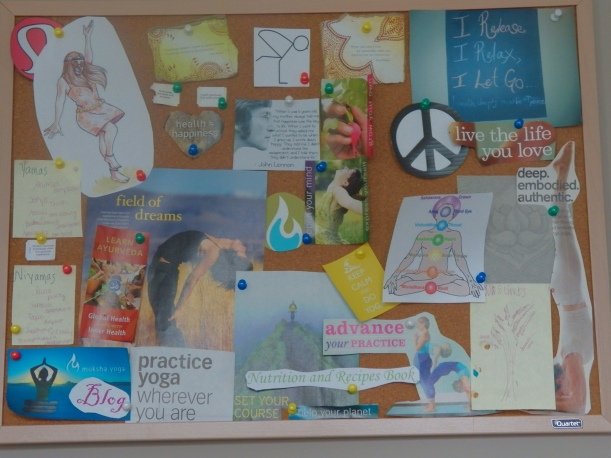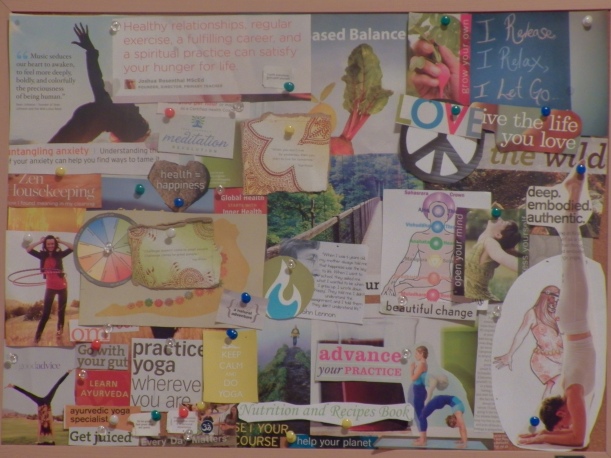
At the end of the summer, I decided I wanted to start a regular meditation practice. I was feeling stress and anxiety creep in from moving, work and life in general. I hopped on YouTube and found a 21-day meditation practice, guided by Oprah and Deepak Chopra. I had done one of these before, so I knew it would be a good blend of meditation and life lessons. As I sat on my meditation cushion, listening to Oprah explain the purpose of the practice that day, she started talking about finding hope through gratitude. She mentioned how this was a turning point for her and that she had been keeping a gratitude journal for more than 20 years.
I realized that a lot of what I had been feeling, the stress and overwhelm, had to do with not recognizing the positive things that were happening each day. I would look around and see the things at my house that needed to be fixed: floors that weren’t finished, rooms that needed to be painted, boxes that needed to be unpacked, and the day-to-day chores that were piling up. I would look at my yard and see grass that needed to be mowed, clippings to mow and trees to trim, not to mention spiderwebs to knock down. My nightstand was full of books I needed to finish. Yoga mats were rolled up in their corner instead off being used. regularly. I wasn’t seeing the beauty and of my house. I wasn’t seeing the wonder of having trees surrounding me and trails to walk. The yoga mats were there for when I was ready to hop on them and the books were waiting for me to crack them open anytime. My brain was stuck in the cycle of waking up and seeing the stress, living each day with the negatives of the stress and not being able to make a change to break the cycle. I needed something to help me get unstuck. I decided that maybe having a moment to write down a positive to even just think of something positive from my day, or week, would help me get out of this funk.
As an SLP, and most likely a stressed out one, I know you can relate to this sinking feeling. At times it seems like nothing in your work setting is how it should be, you can’t help your clients due to lack of budget, training or support, and you feel absolutely overworked and underappreciated.
According to Positive Psychology, it takes 3 positive experiences to make up for a negative one. That means that our brains are wired to remember the things that aren’t great, instead of the things that are. When you look back on your day, if this balance is off, and you have more negatives than the 3:1 ratio, your brain will register it as a negative day. This also relates to your basic survival needs. When we were hunters and gatherers, we always had to be looking for the worst in things, and expecting it, as a means of survival. We had to look out for danger around every corner. Now we do not, but our brains are still ready for that threat at any time.
Your brain is also wired to define experiences as positive or negative based on which note they end. If you end on a low note, your are bound to remember the day as being negative. Think about one of those days when everything has gone great, but you have a fight with your spouse right before bed, you probably categorized that day as being a “bad” or stressful one. Conversely, if you end on a high note, you are bound to remember it as being a positive day. Think about one of these days that started rough, but turned itself around with a few really fun and special moments that made you smile by the end of the day.
Having a gratitude journal can help to not only end on a high note, but also recall more of the positive things from your day, no matter how big or small they might be.
A gratitude journal is nothing more than a place for you to record your thoughts on a day or week, or even month. It is a place for you to reflect on all the good that has happened, and to look back over time at all of the good things that have occurred in your life. Many people, like Oprah, find that having years of gratitude journals to look back at help them to feel uplifted when they are feeling down, as well as look back over the years with fondness.
How to Write a Gratitude Journal:
- Take 5 minutes out of your day, preferably at the end of the day, to start your journal. Try to do this right before you go to bed once a day, week or few times a month. At the end of the day, you’ll be able to reflect back on all that has happened. It will also help you to empty out your thoughts and end your day on a final note, which might help you sleep better.
- List 5 things that you consider positive from the day. It doesn’t matter how big or small, as long as it was something positive. It could be a promotion at work or a new job, being recognized for your hard work, having a co-worked to vent with, baby smiles, a fun client, green-lights on your commute or simply a stranger smiling and saying hello.
- Expand on each item. What emotion did you feel or do you feel when you think back on that instance in your day? What was it about that moment that made you feel so positive?
- Optional: Try to find a way to continue it tomorrow. Reflect on how you can have that feeling on a regular basis. Maybe you make time for your friends, pay it forward with a kind smile or even recognize someone else for their hard work.
If you’d like even more, sign up for the newsletter to get access to the “Daily Reflections” guide full of daily prompts and meditations perfect for journaling. You can sign up below and you’ll receive access to the “SLP Toolbox” as well.
Where do you feel you are lacking gratitude in your life? Is it home life, work a bit of both? Leave it in the comments below with your intentions for starting a gratitude journal. If you’ve ever written one, leave a comment or comment on someone else’s post to let them know how it went for you.
Much Love,
















